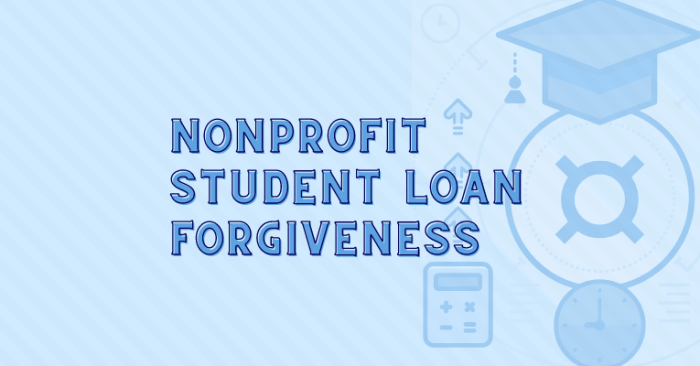
Balancing the pursuit of a fulfilling career with the weight of student loan debt is a significant challenge for many recent graduates. The allure of nonprofit work, driven by a desire to contribute to a cause greater than oneself, often clashes with the financial realities of lower salaries compared to for-profit sectors. This exploration delves into the complexities of navigating this crucial decision, examining the financial considerations, career paths, and available resources to help individuals make informed choices about their future.
This discussion will analyze the various aspects of working for a nonprofit while managing student loan debt. We will explore the trade-offs between salary and personal fulfillment, examine potential benefits packages and loan repayment plans, and identify resources that can ease the financial burden. Furthermore, we will investigate career progression within the nonprofit sector and discuss the long-term implications of prioritizing purpose over immediate financial gain.
The Appeal of Nonprofit Work for Students with Loan Debt
Graduating with substantial student loan debt can significantly impact career choices. While the lure of high-paying jobs in the for-profit sector is strong, many recent graduates find themselves drawn to the mission-driven work of nonprofits, despite the often lower salaries. This choice reflects a complex interplay of personal values, financial considerations, and a desire for meaningful employment.
The decision to pursue nonprofit work after accumulating significant student loan debt involves weighing competing priorities. The perceived trade-off is often framed as choosing personal fulfillment and societal impact over immediate financial gain. While for-profit roles might offer quicker paths to debt repayment, nonprofit work frequently provides a sense of purpose and a feeling of contributing to a greater good that can outweigh the financial challenges. This is especially true for graduates who are passionate about specific social causes or environmental issues.
Nonprofit Loan Forgiveness Programs and Financial Assistance
Many nonprofits understand the financial constraints faced by recent graduates and offer various forms of support. Some organizations directly participate in loan forgiveness programs, such as those offered through the federal government’s Public Service Loan Forgiveness (PSLF) program. Others may provide tuition reimbursement or other financial assistance programs to help employees manage their debt. It’s crucial for prospective employees to research specific organizations and inquire about available benefits during the application process. For instance, some large international NGOs might offer robust employee assistance programs, including financial counseling and debt management resources. Smaller local charities might offer more limited benefits, but their commitment to employee well-being could manifest in other ways, such as flexible work arrangements or generous paid time off.
Lifestyle and Career Satisfaction: For-Profit vs. Nonprofit
The lifestyle and career satisfaction associated with for-profit and nonprofit employment often differ significantly. For-profit roles may offer higher salaries, more structured career paths, and potentially greater opportunities for advancement, but they may also involve longer hours, more intense pressure, and less emphasis on work-life balance. In contrast, nonprofit jobs may offer a more collaborative and mission-driven work environment, potentially leading to greater job satisfaction and a stronger sense of community. However, this often comes with lower pay, less defined career progression, and potentially less job security. For example, a recent graduate might find themselves working long hours at a fast-paced tech startup, striving for promotions and high earnings, versus working fewer hours at a local food bank, experiencing less stress but slower career growth. The choice depends on individual priorities and long-term goals.
Career Paths and Opportunities in the Nonprofit Sector
The nonprofit sector offers a diverse range of career paths, attracting individuals from various academic backgrounds and skill sets. The common thread is a commitment to social good, but the specific roles and responsibilities are incredibly varied, providing ample opportunities for growth and specialization. Many nonprofits value the unique perspectives and skills that recent graduates bring, offering entry-level positions that can lead to fulfilling and impactful careers.
Common Career Paths in the Nonprofit Sector
The nonprofit world welcomes professionals from all disciplines. A background in social sciences might lead to roles in program development or community outreach, while those with business acumen might find themselves in fundraising or management. Individuals with strong communication skills are frequently sought for roles in marketing, public relations, or advocacy. Even those with technical skills in data analysis or web development can find valuable positions supporting a nonprofit’s operational needs. Here are some examples:
- Program Managers: Oversee specific projects or initiatives, often requiring strong organizational and interpersonal skills.
- Development Officers/Fundraisers: Secure funding through grants, individual donations, and corporate sponsorships, needing excellent communication and relationship-building skills.
- Communications Specialists: Manage public relations, marketing, and social media for the organization, demanding creativity and writing skills.
- Community Outreach Workers: Engage with the community, build relationships, and provide services, requiring strong interpersonal and communication skills.
- Data Analysts: Analyze data to inform program development and track impact, needing proficiency in data analysis software and statistical methods.
Highly Valued Skills and Experiences for Nonprofit Graduates
Nonprofits often prioritize candidates demonstrating specific skills and experiences. While technical skills are important depending on the role, “soft skills” – those related to interpersonal interactions and personal attributes – are often highly valued. These skills demonstrate a candidate’s ability to work effectively within a team and contribute to a positive work environment.
- Strong communication skills (written and verbal): The ability to clearly and effectively communicate with diverse audiences is crucial.
- Teamwork and collaboration: Nonprofits often rely on collaborative efforts to achieve their goals.
- Problem-solving and critical thinking: The ability to analyze situations, identify challenges, and develop solutions is essential.
- Passion for the mission: Genuine interest in the organization’s cause is highly valued.
- Organizational skills and time management: Effectively managing multiple tasks and deadlines is key.
- Experience in relevant fields (volunteering, internships): Demonstrates commitment and practical experience.
Hypothetical Career Progression in a Nonprofit: Environmental Conservation
Let’s consider a hypothetical career progression within an environmental conservation nonprofit. A recent graduate with a degree in environmental science might start as a Program Assistant (approximately $35,000-$45,000 annually). After two years, demonstrating strong performance and initiative, they could be promoted to Program Coordinator ($45,000-$55,000). With further experience and demonstrated leadership, they could advance to Program Manager ($60,000-$75,000) within five years, and potentially to Director of Programs ($80,000-$100,000) after a decade. These salary ranges are estimates and vary significantly based on location, organization size, and individual performance.
Examples of Successful Individuals Managing Student Loan Debt While Working in the Nonprofit Sector
While nonprofit salaries may be lower than in the for-profit sector, many individuals successfully manage student loan debt while pursuing fulfilling careers. For example, a case study from the National Council of Nonprofits could illustrate how individuals prioritize budgeting, explore loan repayment options (like income-driven repayment plans), and leverage additional income streams (such as part-time work or freelance opportunities) to manage their debt while contributing to a cause they are passionate about. The key is careful financial planning and a commitment to both career goals and debt reduction. Specific examples of individuals would require obtaining their permission for publication and would be outside the scope of this current response.
Resources and Support for Nonprofit Employees with Student Loans

Navigating student loan debt while working for a nonprofit can feel daunting, but numerous resources and support systems exist to ease the burden. Many organizations recognize the financial challenges faced by their employees and offer assistance programs specifically designed to help manage student loan repayments. Understanding these resources and leveraging available networks is crucial for financial well-being and career advancement within the sector.
Several avenues exist to help nonprofit employees manage their student loan debt effectively. These range from practical financial planning tools to access to professional advice and community support. Taking advantage of these options can significantly reduce stress and improve long-term financial stability.
Financial Counseling Services and Debt Management Tools
Many nonprofit organizations offer employee assistance programs (EAPs) that include financial counseling. These services provide personalized guidance on budgeting, debt management strategies, and exploring options like income-driven repayment plans or loan forgiveness programs. Independent financial advisors specializing in student loan debt management also exist and can offer tailored solutions. Online tools and budgeting apps can complement professional advice, providing a practical way to track expenses and monitor progress towards debt reduction. For example, tools that allow for detailed budgeting and debt tracking can be invaluable in creating a clear plan to tackle student loan repayments.
Benefits of Joining Professional Organizations and Networks
Joining professional organizations within the nonprofit sector offers significant benefits beyond professional development. These networks often provide access to exclusive resources, including workshops on financial literacy and networking events that can connect members with potential mentors and employers. The collective knowledge and experience within these groups can prove invaluable in navigating the complexities of student loan repayment and career advancement.
Networking and Financial Aid Opportunities
Networking within the nonprofit sector can lead to unexpected opportunities. Conversations with colleagues, mentors, or individuals encountered at industry events can reveal lesser-known financial aid programs, scholarships, or loan forgiveness initiatives specific to nonprofit employees. Moreover, strong professional connections can significantly increase the chances of securing a higher-paying position within the nonprofit world, accelerating the ability to repay student loans. For instance, a conversation at a conference might lead to an introduction to a hiring manager at an organization offering higher salaries and better benefits.
Financial Literacy Resources for Young Professionals
Access to reliable financial information is key to effective debt management. Several websites and organizations offer free or low-cost resources specifically designed for young professionals. These resources can help develop strong financial habits and navigate the complexities of student loan repayment.
- The National Endowment for Financial Education (NEFE): Offers a range of free financial education resources, including budgeting tools and articles on student loan management.
- Investopedia: Provides comprehensive information on personal finance topics, including articles and guides on student loan repayment strategies.
- Consumer Financial Protection Bureau (CFPB): A government agency offering resources and tools to help consumers understand and manage their finances, including information on student loans.
- Your institution’s Human Resources department: Many organizations provide access to financial wellness programs or resources as part of their employee benefits package.
The Impact of Student Loan Debt on Career Choices in the Nonprofit Sector

The substantial burden of student loan debt significantly impacts the career choices of recent graduates, particularly those considering careers in the nonprofit sector. The relatively lower salaries often associated with nonprofit work, when weighed against the pressure of loan repayment, can create a powerful disincentive. This financial reality forces many graduates to prioritize immediate financial stability over pursuing their passion for social good.
The weight of student loan debt can lead to a variety of consequential choices. Graduates may opt for higher-paying jobs in the for-profit sector, even if those roles are less fulfilling, to expedite loan repayment. This often results in delayed gratification, postponing the pursuit of their ideal career path in the nonprofit sector indefinitely. The financial strain can also limit opportunities for professional development within the nonprofit sector, as individuals may forgo further education or training to focus on debt reduction.
Consequences of Delaying Career Goals Due to Loan Repayment
Delaying career goals to prioritize loan repayment can have far-reaching consequences. Opportunities for advancement and skill development within the nonprofit sector may be missed. The longer a graduate waits to enter the field, the more competitive the job market becomes, potentially leading to less desirable roles or a prolonged period of lower pay. Moreover, a delayed start can hinder the development of professional networks crucial for success in the nonprofit world. For example, a recent graduate with a passion for environmental conservation might postpone working for a conservation organization to take a higher-paying, but less fulfilling, job in finance. This delay could result in lost opportunities for networking and skill-building in the environmental sector, potentially making it harder to transition into their desired career later on.
Long-Term Financial Outlook: High Earning Potential vs. Prioritizing a Cause
The long-term financial outlook differs significantly between those prioritizing high earning potential and those prioritizing a cause. Individuals pursuing high-paying jobs in fields like finance or technology typically accumulate greater wealth over their careers. However, this often comes at the cost of personal fulfillment and a reduced sense of contributing to something larger than themselves. Conversely, individuals who prioritize working for a cause may earn less initially but may experience greater job satisfaction and a stronger sense of purpose, potentially leading to improved long-term well-being. The financial stability provided by a higher-paying job might allow for quicker debt repayment, but the lack of fulfillment can lead to stress and burnout, impacting overall quality of life. Conversely, working in a fulfilling nonprofit role may bring more personal satisfaction but might require a longer period of debt repayment. This scenario highlights the complex trade-off between financial security and personal fulfillment.
Psychological and Emotional Toll of Student Loan Debt on Career Satisfaction
Significant student loan debt can exert a considerable psychological and emotional toll, impacting career satisfaction. The constant stress and anxiety associated with loan repayment can negatively affect job performance, motivation, and overall well-being. The pressure to earn more money can lead to feelings of guilt or resentment if the chosen career path doesn’t align with personal values or passions. For instance, a recent graduate with significant debt might feel forced to accept a high-pressure, high-paying job in corporate law, despite a strong desire to work in social justice. This mismatch between career and personal values can lead to dissatisfaction and burnout, potentially hindering their long-term career prospects. This constant financial pressure can also negatively impact mental health, further compounding the challenges of finding career satisfaction.
End of Discussion

Ultimately, the decision of whether to pursue a career in the nonprofit sector while managing student loan debt is deeply personal. While financial challenges are undeniable, the potential for significant personal and professional fulfillment should not be underestimated. By carefully weighing the financial realities against personal values and utilizing available resources, individuals can make informed decisions that align with their long-term goals and well-being. The path forward requires careful planning, resourcefulness, and a clear understanding of the opportunities and challenges involved.
Top FAQs
Can I use my student loans to pay for living expenses while working for a nonprofit?
Generally, student loan funds are intended for educational expenses. Using them for living expenses is possible, but it increases your overall debt and may have long-term financial implications. It’s crucial to budget carefully.
Are there any tax benefits for working at a nonprofit?
Some nonprofits offer tax advantages, such as tax-exempt status for certain contributions. However, specific tax benefits depend on the individual’s circumstances and the specific nonprofit’s structure. Consulting a tax professional is recommended.
What if I default on my student loans while working for a nonprofit?
Defaulting on student loans has severe consequences, including wage garnishment, damage to credit score, and difficulty obtaining future loans. Explore available repayment options and seek help from financial aid counselors before defaulting.
